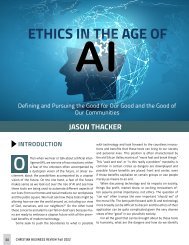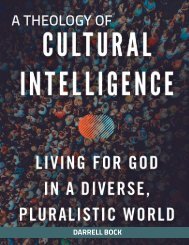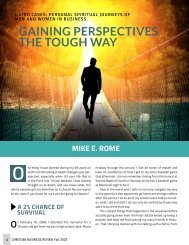Christian Business Review 2022: Pressing On Toward God's Goal
You also want an ePaper? Increase the reach of your titles
YUMPU automatically turns print PDFs into web optimized ePapers that Google loves.
ETHICS IN THE AGE OF AI<br />
CBR ARTICLES<br />
good, right, and moral in these situations? How does fairness<br />
or being socially beneficial in this context line up with the<br />
safety of our brothers and sisters on the battlefield? What is<br />
fair and socially beneficial about terrorists and rogue nations<br />
having unequal access to these powerful tools and gaining<br />
an advantage? In a world longing for direction and guidance<br />
on how best to utilize these technologies in our communities<br />
and workplaces, how should <strong>Christian</strong> leaders assess these<br />
technologies in light of biblical ethics codes?<br />
THE BEAUTY OF THE<br />
CHRISTIAN ETHIC<br />
Without clarity on the details of various ethical principles<br />
such as “fairness” or being “socially beneficial,” it<br />
will be difficult for our society to judge ethically the role and<br />
power of technology. As technology gets folded into nearly<br />
every aspect of life, it’s nearly impossible to avoid the conflicts<br />
between what is true and what we want to be true.<br />
As <strong>Christian</strong>s,<br />
our ethical decision<br />
framework should not<br />
be linked to the prevailing<br />
subjective attitudes<br />
of certain elites,<br />
the in-crowd, or the<br />
“right side of history.”<br />
At the most basic level,<br />
the <strong>Christian</strong> ethic<br />
is a transcendent or revealed morality seen in the natural<br />
order as well as in Scripture. 34 This means that our ethical<br />
decisions are not made based on what is popular but what<br />
is true and what have been shown to us by God. He spoke to<br />
us and revealed how we are to live in light of who he is and<br />
how he made each one of us in his own image (Gen. 1:26-28).<br />
Christ himself summed up the entirety of the <strong>Christian</strong> ethic<br />
in Matthew 22:37-39 when he said that the greatest commandment<br />
was to “love the Lord your God with all your heart<br />
and with all your soul and with all your mind. And the second<br />
is this, you shall love your neighbor as yourself.”<br />
Theologian and ethicist Carl F.H. Henry once wrote, “love<br />
for another is the whole sum of <strong>Christian</strong> ethics.” 35 Henry was<br />
undoubtably influenced by the German theologian Christoph<br />
Ernst Luthardt, who described the relationship of theology<br />
and ethics as, “God first loved us is the summary of <strong>Christian</strong><br />
At the most basic level, the <strong>Christian</strong><br />
ethic is a transcendent or revealed<br />
morality seen in the natural order as<br />
well as in Scripture.<br />
doctrine. We love Him is the summary of <strong>Christian</strong> morality.”<br />
36 This notion of loving others — both God and our neighbors<br />
— steers us away from the individualistic pursuit of<br />
truth and ethics that so characterizes contemporary discussions<br />
and toward honoring the humanity of our neighbors.<br />
We must seek to love them as God has loved us. 37<br />
Even in the face of difficult ethical challenges in the age<br />
of AI, this simple yet profoundly robust ethical guidepost is<br />
more than capable of helping us confront the complex questions<br />
of the day. This <strong>Christian</strong> ethic runs contrary to the<br />
prevailing moods and ethical outlooks of the day. It forces<br />
us to look outside of ourselves towards others. It steers us<br />
away from the things that we desire. It replaces the ethic<br />
that is built upon autonomy and individualism with one that<br />
is God-centered - a theocentric instead of an anthropocentric<br />
ethic. 38<br />
Naturally, questions arise about what it means to actually<br />
love God and love our neighbor. 39 Simply put, to love God is<br />
to follow his commandments as stated in 1 John 5:3. This<br />
means seeing the good of others, pursuing justice, and upholding<br />
human dignity.<br />
It means sometimes<br />
sacrificing our<br />
personal desires<br />
- our “profits”, as<br />
we seek to love God<br />
more than we love<br />
ourselves and to<br />
love those who God<br />
himself loves.<br />
For business leaders, this does not mean that we forsake<br />
growth, profits, or improvements that can often honor others<br />
and help build communities. It does mean, however, that<br />
we have a higher calling: to love God and love our neighbors<br />
over and above what society typically deems as success. This<br />
also means that business leaders may have to do the counter-cultural<br />
thing of putting people above profits and systems,<br />
or refusing to employ certain technologies that could<br />
hurt people rather than honor them as fellow (God’s) image<br />
bearers.<br />
In this age of AI, the <strong>Christian</strong> ethic calls us to live in a<br />
certain way that reflects the goodness of our creator and our<br />
love for our neighbor. It reminds us that truth is not in the<br />
eye of the beholder and that technology is more than simply<br />
a tool we use. Technology can work to form and shape us in<br />
very particular ways — both for good and ill.<br />
CHRISTIAN BUSINESS REVIEW Fall <strong>2022</strong> 552














